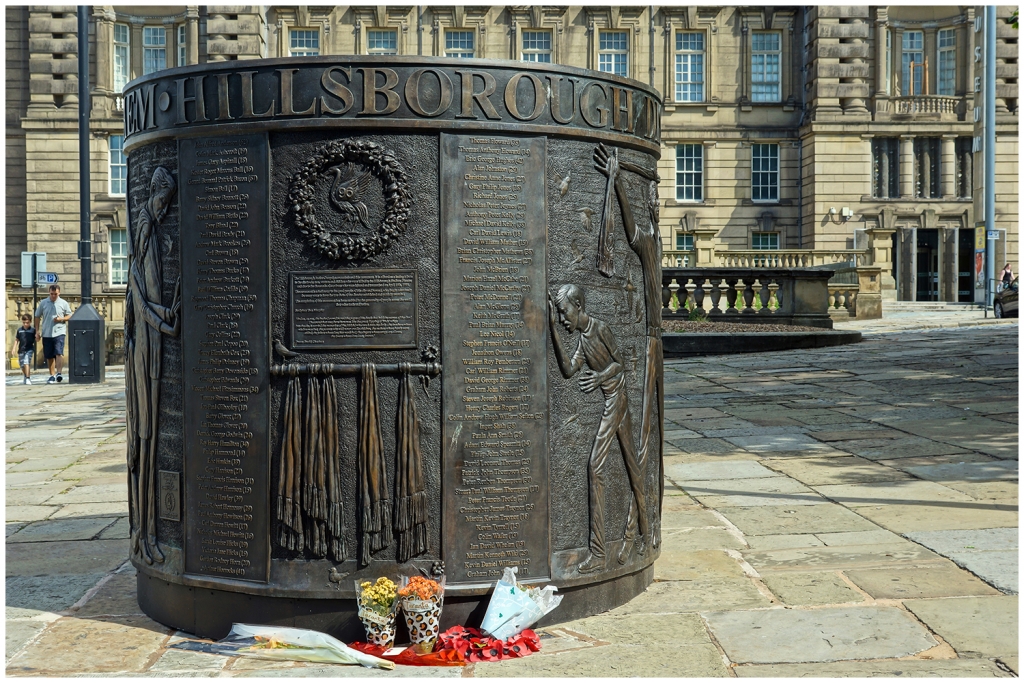
 Over 27 years after the Hillsborough disaster, a jury found that the football fans were unlawfully killed. During the inquests, the police officer in charge gave evidence about the events which led to the fatal crush, testifying that it was not the Liverpool fans who forced open the exit gate to enter the ground, but the police. Nick Turnbull and Dave Richards write that the case prompts a series of questions that go right to the heart of the debate on the current malaise within many of Britain’s public institutions.
Over 27 years after the Hillsborough disaster, a jury found that the football fans were unlawfully killed. During the inquests, the police officer in charge gave evidence about the events which led to the fatal crush, testifying that it was not the Liverpool fans who forced open the exit gate to enter the ground, but the police. Nick Turnbull and Dave Richards write that the case prompts a series of questions that go right to the heart of the debate on the current malaise within many of Britain’s public institutions.
Winston Churchill referred to it as ‘terminological inexactitude’. The former Cabinet Secretary Robert Armstrong invoked the spirit of Edmund Burke to suggest that ‘a misleading impression, [is] not a lie. It was being economical with the truth’. The former minster Alan Clark did likewise, but predictably with more élan described it as being ‘economical with the actualité’. More recently Grant Shapps admitted he had ‘overly firmly’ denied his position in relation to a second job. Public life, as with everyday life, is littered with examples of individuals dissembling to defend a position of interest. Yet, what happens if the sophistry involved by a public official is revealed to be much more than a simple discursive nuance of the truth and instead is exposed as an overt lie? The findings from the recent Hillsborough Inquiry bring this question sharply into focus.
At the Inquest, the match police commander on the day of the disaster surprised many with his testimony: it was not the Liverpool fans who forced open an exit gate to enter the ground, but the police – following his orders. David Duckenfield offered an unreserved apology to the families of the supporters who died or were injured in the disaster. Since that fateful day in 1989, police officers were accused of colluding in a gratuitous cover-up, aided and abetted by certain media outlets sustaining a false narrative of blame on the Liverpool supporters.
Twenty-five years on, Duckenfield has expressed feelings of remorse. Elsewhere, Kelvin MacKenzie, the former editor of the Sun, distanced himself and his former newspaper from the events, claiming it was an: ‘Absolute disgrace what police have done in South Yorkshire these last 27 years. I feel desperate for the families…I also feel in some strange way I got caught up in it.’ For the families themselves, who always knew that the supporters were not in the wrong, it is hard to know if such apologies are seen as carrying real substance, but they do stand as testament to their longstanding perseverance in seeking out the truth.
The passage of time since the Hillsborough tragedy has witnessed a growing perception – not without substance – that British institutions are increasingly mired in a widespread set of crises. The antecedents to many of the current crises appear to have historical overtones attached to them. Elsewhere, there are numerous surveys charting an acceleration in the erosion of trust in once respected pillars of the state – Westminster, the Civil Service, the Judiciary, the Police, Security Agencies, the NHS etc.
There is an obvious relationship of dependency between truth and trust. In a climate of anti-politics, it is timely to reflect on the corroding effect that revelations of incidents of overt lying – be it in relation to Hillsborough, Savile, Rotherham, the death of Ian Tomlinson, cover-up of whistleblowing in the NHS etc. – has reaped. This question is pertinent not only in the context of the on-going collapse in legitimacy of our political institutions, but also in terms of their future capacity to renew or rebuilt trust in the eyes of the public they seek to serve.
Hillsborough prompts a series of questions that go right to the heart of the debate on the current malaise within many of Britain’s public institutions. How can a state official get away with a blatant lie to cover up a poor decision? What does it mean that so many officials from a number of public agencies participated in the propagation of that lie? And how can it be that a group of individual fans, a football club – even a whole working class cultural institution – can be unfairly blamed, demonised and denigrated by the state? Surely this is an action belonging to an authoritarian regime of the kind we have historically opposed, one hell-bent on using propaganda and misinformation to hold on to power and suppressing opposition. Can this really be democracy in modern Britain?
Is it the case that lying pays off for public officials? If you have failed in your position, and you’re going to lie about your incompetence, then the best thing to do is to persist with the lie, no matter what the alternative reading of the facts. Tim Slessor in his study of the Ministry of Defence referred to this as ‘the infallibility syndrome’. Your seniors will interpret the action not as your own failure, but as a threat to the legitimacy of the institution [or more broadly the state] and respond by colluding to cover it up, extending the lie, bullying anyone who questions it, and enlisting the support of a scandal-hungry media with a vested interest in not asking too many questions. Then, stick to the official story for as long as you can, because it may never come out at all.
It can be argued that there is obvious connection here between such a disposition and a wider, cultural mind-set underpinning many of Britain’s institutions. There is now a sizeable critical literature on the British Political Tradition that identifies the emergence and perpetuation of a dominant, governing culture, the roots of which can be traced back to the 19th century to what Mick Moran refers to as ‘club governance’, sustained by what David Vincent identifies as the principle of ‘honourable secrecy’.
It is a theme Andrew Taylor alights upon in his study of Hillsborough in the recently published Interpreting Governance: High Politics and Public Policy. He argues that the deep politics of the British state is based on an ingrained culture of secrecy in support of the maintenance of public order at all costs. This narrative of governance is extremely resistant to change. It is fundamental to our public institutions, keeping the bureaucracy insulated from the ‘outside’, even keeping the truth within a coterie of insiders within the state. It led every key police officer involved in the Hillsborough disaster to instinctively cover-up the truth of police failings and then to carry on with the deception until, finally, it has been forced out into the open against their own best efforts. A similar set of charges are now being made in the context of Orgreave. The parallels with Slessor’s earlier study are clear to see.
Of course, we can speculate as to the real value of the increasing number of apologies made to the supporters and their families, given that they have essentially been made only when the lie could no longer be sustained. But more importantly, the whole affair poses fundamental questions about our public institutions. Is it any wonder that citizens do not trust public institutions and their officials, when lying to the public is considered from an essentially utilitarian perspective, to be in the public interest, even when so many people have been killed and injured?
For the officials involved, being exposed may lead to prosecutions, more than 25 years after the event. The truth is still only coming out now, the officials concerned are mostly of retirement age, but the repercussions of their actions are having an on-going effect on the institutions they are walking away from.
It might be that in some cases, the long-run lie has paid off for public officials and their institutions. The time lag provides its own inertia, although the pressure on South Yorkshire Police itself is now sizeable. But more importantly, we must ask the question can the deep culture of secrecy within the British state ever change? Secrecy is a tradition that is relied upon by decision makers of all stripes, to give them a measure of autonomy and distance from potential criticism, regardless of the quality of their decisions. In such a culture, any given individual who wishes to lie can likely count on his or her colleagues to actively participate in the deception, not just for self-interest but because it is a way of governing, a grounding idea embedded in our institutions.
Yet things may be changing and the cracks in the traditional codes of governing are opening-up. As we have argued elsewhere, there is a case to suggest that we are witnessing an emergent clash of two cultures; a more open, less-deferential society empowered ostensibly through social media informed by digitalisation and access to big data is increasingly and successfully challenging the ‘formal truth’ presented by closed, self-governing institutions. Such a shift suggests that institutions and their actors must be much more certain in the future that the claims they make to the truth can be legitimately substantiated. For the risk of exposure to an overt lie when defending an institutional position is greater now than it ever has been.
 Nick Turnbull is a Lecturer in Politics at the University of Manchester.
Nick Turnbull is a Lecturer in Politics at the University of Manchester.
 Dave Richards is Professor of Public Policy at the University of Manchester.
Dave Richards is Professor of Public Policy at the University of Manchester.









I was a first year undergraduate when the Hillsborough tragedy occurred. I watched the events unfold on tv as it happened and distinctly recall seeing at least one police officer push a desperate young man back into the crowd after he had climbed up onto the top of the paddock railings. It was obvious with anyone with eyes to see that this wasn’t caused by the fans and the fans were actually the ones trying to help the injured and dying. But when I returned to university I was utterly shocked to be shouted down by the majority of my classmates for suggesting the police were at fault. I knew then that if so many could be so easily fooled by ugly lies in the newspapers and in the tv media my country was in deep trouble and it’s only got worse since then.
Interesting read. The truth was actually “hidden in plain sight” all along. This was the finding of Lord Taylor. He put the blame on the police and their loss of control. What is apparent all these years later is the government of the time – at the very highest levels- colluded with a smear campaign (The prime minister’s Press secretary Ingham, was involved in spreading the lie and still clings to it along with his knighthood). The cover up was top down as well as bottom up. As you say, it was about preserving the legitimacy of the establishment. Even the new inquest process was flawed. Crompton was allowed interested person status, and state funded legal representation, yet the survivors were denied this status despite the coroner including a question in the verdict that could have potentially found the survivors guilty. This was accompanied by LJ Goldring saying none of the 96 fatalities were to blame, yet here he was asking the jury to look at whether the person crushed alongside a dead person was to blame.
Even inquest decision, we still had the media broadcasting the lies out of the mouths of ex SYP, and the police Federation.
Justice will only be served when the police officers (and anyone else involved in the perversion of justice) have faced trial. Age should be no barrier, and if found guilty then they should be jailed. They were supposed to protect and serve the public. They did neither and have continued pervert the course of justice for 27 years.